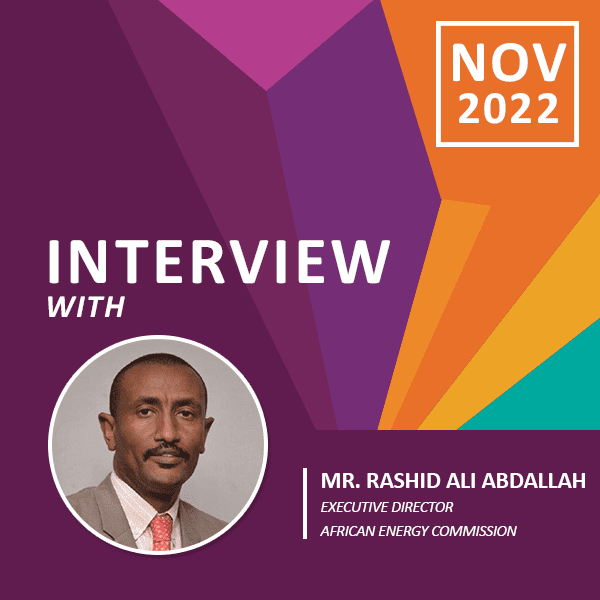Can you share with us steps taken to work towards achieving energy transformation goals and progress towards agenda 2063 commitments
- Africa’s energy system is characterized, among others, by having more than half of continent’s population who do not have access to reliable electricity either and over 70% of Africans currently lacking access to clean cooking, exposing them to household air pollution and increasing vulnerability to respiratory illnesses. Which means Africa need special attention when it comes to energy transformation energy access and security. In addressing this issue AFREC has a broad mandate which is to develop the African energy sector by coordinating, harmonizing, protecting, conserving, developing, and promoting rational exploitation, commercialization, and integration of energy resources in Africa.
- The African Union Agenda 2063 highlights the need to enhance regional and continental efforts for accelerated and integrated infrastructure development in Africa, through high-level policy development and engagement, consensus building, promotion of regional integration to support the development of energy resources in Africa. While the goals of Agenda 2063 are more relevant, the current realities warrant a more responsive approach to energy sector development.
- In doing so, the AU decision organs requested AFREC to work on strategic pillars namely: (i) the African Energy Information System; (ii) the Bioenergy development; (iii) the Energy Efficiency and Transition; (iv) the African Oil & Gas Domestic Market (v) the development of renewable energy; (vi) the Comprehensive capacity and skills development, which will lead to the development of the Africa energy sector.
- Henceforth, AFREC has taken various steps by implementing various projects by supporting all AU Member States to (i) improve their national energy statics, (ii) develop technical skills in energy sub-sectors, (iv) have good monitoring and reporting systems of their bioenergy resources and consumption as well as measure to improve the efficiency in energy use so that significant savings can be made (v) providing training of government officials in energy data collection and (vi) conducting surveys and feasibility studies creating Africa’s oil and gas domestic market and biomass.
what are the key challenges or obstacles in harmonizing energy policies across the continent and in your view, what are the current priorities?
- The Energy situation is different across African countries and regions. Most sub-Saharan countries still rely heavily on traditional and non-efficient biomass to meet domestic needs and some productive activities.
- Another prevalent challenge is the unevenness in energy production and use. Africa accounts for just 2.9% of the world’s primary energy consumption. Within the continent, two countries alone (Algeria and South Africa) consume more than 63% of the continent’s primary energy and four countries (including Egypt and Morocco) account for as much as 88% of the total.
- Energy trade within Africa remains marginal, reflecting the low rate of Africa’s economic integration and limited exchange of goods and services between African countries.
- Institutional and administrative capacity remains limited and is a fundamental bottleneck to enabling the required action across all other areas.
- Many African countries have pursued electricity sector reforms. The legislative and institutional models for electricity markets differ for each jurisdiction and the states are at different levels of progress and development.
- At the regional level, sector policy and development are defined by the Regional Economic Communities (RECs). Some of these have established various specialised agencies for regulating the power pools and the promotion of Renewable Energy (RE) and Energy Efficiency (EE).
- Each region has a framework ‘Energy Protocol’ which guides sector development at the regional and member states levels. Most of the RECs have established power pools and centres for promoting renewable energy and energy efficiency.
- Political drive for change remains a major challenge at all levels. The gaps and barriers at the national level include inadequate policies, legislation, institutional and governance structures, procurement and dispute resolution frameworks, lack of transparency and individual countries pursuing their own energy development partnership with other overseas countries, which defeats the purpose of energy integration and resource sharing platform offered by the AfCFTA.
- The development of second tier regulations which spell out the rules of the game remains a challenge. Technical rules for the conventional electricity, mini and off-grid systems are not in place in several jurisdictions.
- Apart from the resource and capacity barriers, most of the RECs lack the legislative powers necessary to enforce decisions. A similar situation pertains at the continental level as the AUC and other continental organisations also lack the legislative powers that would bind the RECs and member states. Mechanisms are needed for enforcement, greater coordination and dialogue at different levels.
- It is essential that Africa creates a stable, transparent and predictable environment to attract investments in the energy sector in Africa and promote cross border trading of electricity, to domesticate the harmonised framework that AUC developed.
There has been a lot of discussion on just energy transition and what may be the solutions to energy poverty considering the developmental needs of the continent
what’s the commissions view (working towards ending energy poverty) , plans and or vision on this issue?
- Africa’s contribution to the emission of Carbon dioxide (CO2) is by far the lowest with only 3% of the global emissions.
- Despite its low contribution to the emission of CO2, Africa impact from climate change threatens the continent severely. In fact, primary sectors such as agriculture, livestock, fishing and forest exploitation, which are key sectors for Africa’s economy and food security are heavily affected.
- Therefore, it is crucial that African countries pursue a development agenda which also target and exploit its resources in a sustainable way and not conform to what other developed countries frame as transition.
- AU adopted this year in July the African Common Position on Energy Access and Just Transition which clearly defines Africa’s priority which is to ensure access to sustainable, affordable and efficient energy for All and energy security.
- Africa plays an important role in the global oil market, currently holding 7.2% of the world’s total proved oil reserves. Our data (AFREC: 2021) indicates that Oil & Natural gas represent more than 40% of Africa’s energy mix, slightly behind bioenergy at 45%.
- Africa’s contribution to the global crude oil production stands at 10%. What is appalling is that over 70% of our crude oil production and 45% of total production of natural gas is exported. Such practices have forced the continent to rely on imports, remaining the only continent which is a net exporter of crude oil and net importer of petroleum products. This trend indicates a low level of domestic processing, and consequently several missed opportunities for value addition, jobs, local manufacturing, and trade.
- The African energy transition programme clearly sets out a vision/road map and the approach for a major Africa-wide energy sector strategy aimed at accelerating the transition of the continent’s energy systems and decarbonisation path, to foster meaningful economic well-being, wealth creation, poverty eradication and inequality reduction in order to realise Africa’s development aspiration in a manner that is sustainable, climate compatible and responsive to Africa’s need.
- Hence, in consideration of Africa’s energy transition, natural gas can be leveraged to power Africa at a larger scale, while at the same time, reducing CO2 emission and climate change effects. In addition, with the AFCFTA, increasing cross national and regional trading, investment and infrastructure development can improve the continent sector, by re-aligning its priorities of value addition, resources ownership and development.

